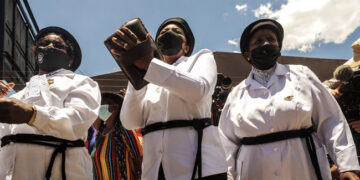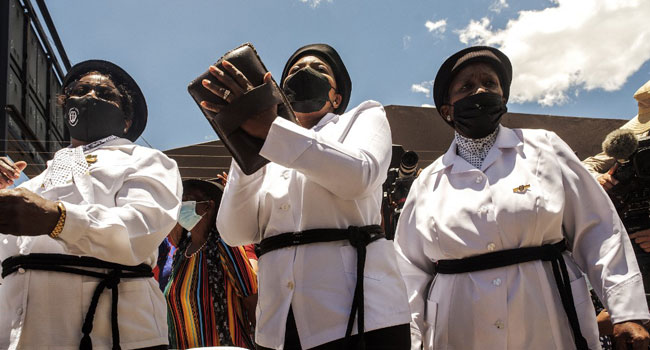By Ebi Kesiena
With a few white plastic chairs in front of his house and umbrellas to shield the midday heat, neighbours in Soweto, South Africa’s bustling township where Desmond Tutu lived during apartheid, have paid tribute to the fearless cleric.
Tutu died in Cape Town on Sunday aged 90.
Linda Malinda, now 63 recalls that he used to tell her go to school, you must fight for your rights knowing exactly what you are fighting for.
She still resides in the same house she stayed in with her parents back then, in the 1970s, just a few meters from the anti-apartheid icon’s house in the township, a crucible of the struggle against a brutal minority regime.
In 1985, the world’s most famous clergyman was ordained as the first black Anglican bishop of Johannesburg.
20 years earlier, the school teacher walked out of the classroom to protest against the deteriorating standards of education for blacks and the introduction of racial segregation in schooling.
“They made sure to teach them just enough English for them to understand the orders they will be given,” Tutu said in 1995.
On a southern hemisphere summer day, a few dozen people, some dressed in black-and-white church uniforms, converged for a religious ceremony in front of Tutu’s home, along the popular Vilakazi street.
A blue plaque on a wall of Tutu’s house reminds visitors that a “champion of human rights once lived here”.
A small podium and speakers are set up on the sloppy street, where two freedom struggle icons and Nobel laureates Tutu and Nelson Mandela once lived just a few dozen metres apart.
A sign points the way to the “Nobel Prize Walk”. Groups of tourists stop by.
Some dropped a note in the condolence book placed on a table, pages being gently flipped by the wind: “Thank you for what you have done for humanity” and “Thank you for being the voice of the voiceless”.




































